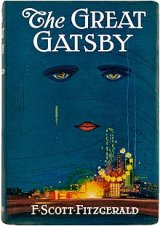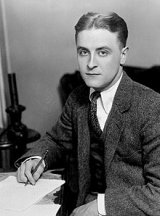The Great Gatsby Page #12
The Great Gatsby is a 1925 novel by American writer F. Scott Fitzgerald. Set in the Jazz Age on Long Island, near New York City, the novel depicts first-person narrator Nick Carraway's interactions with mysterious millionaire Jay Gatsby and Gatsby's obsession to reunite with his former lover, Daisy Buchanan. The novel was inspired by a youthful romance Fitzgerald had with socialite Ginevra King, and the riotous parties he attended on Long Island's North Shore in 1922
assumed an inky colour, and pursued the rest of their way in slow black rivulets. A humorous suggestion was made that she sing the notes on her face, whereupon she threw up her hands, sank into a chair, and went off into a deep vinous sleep. “She had a fight with a man who says he’s her husband,” explained a girl at my elbow. I looked around. Most of the remaining women were now having fights with men said to be their husbands. Even Jordan’s party, the quartet from East Egg, were rent asunder by dissension. One of the men was talking with curious intensity to a young actress, and his wife, after attempting to laugh at the situation in a dignified and indifferent way, broke down entirely and resorted to flank attacks—at intervals she appeared suddenly at his side like an angry diamond, and hissed: “You promised!” into his ear. The reluctance to go home was not confined to wayward men. The hall was at present occupied by two deplorably sober men and their highly indignant wives. The wives were sympathizing with each other in slightly raised voices. “Whenever he sees I’m having a good time he wants to go home.” “Never heard anything so selfish in my life.” “We’re always the first ones to leave.” “So are we.” “Well, we’re almost the last tonight,” said one of the men sheepishly. “The orchestra left half an hour ago.” In spite of the wives’ agreement that such malevolence was beyond credibility, the dispute ended in a short struggle, and both wives were lifted, kicking, into the night. As I waited for my hat in the hall the door of the library opened and Jordan Baker and Gatsby came out together. He was saying some last word to her, but the eagerness in his manner tightened abruptly into formality as several people approached him to say goodbye. Jordan’s party were calling impatiently to her from the porch, but she lingered for a moment to shake hands. “I’ve just heard the most amazing thing,” she whispered. “How long were we in there?” “Why, about an hour.” “It was … simply amazing,” she repeated abstractedly. “But I swore I wouldn’t tell it and here I am tantalizing you.” She yawned gracefully in my face. “Please come and see me … Phone book … Under the name of Mrs. Sigourney Howard … My aunt …” She was hurrying off as she talked—her brown hand waved a jaunty salute as she melted into her party at the door. Rather ashamed that on my first appearance I had stayed so late, I joined the last of Gatsby’s guests, who were clustered around him. I wanted to explain that I’d hunted for him early in the evening and to apologize for not having known him in the garden. “Don’t mention it,” he enjoined me eagerly. “Don’t give it another thought, old sport.” The familiar expression held no more familiarity than the hand which reassuringly brushed my shoulder. “And don’t forget we’re going up in the hydroplane tomorrow morning, at nine o’clock.” Then the butler, behind his shoulder: “Philadelphia wants you on the phone, sir.” “All right, in a minute. Tell them I’ll be right there … Good night.” “Good night.” “Good night.” He smiled—and suddenly there seemed to be a pleasant significance in having been among the last to go, as if he had desired it all the time. “Good night, old sport … Good night.” But as I walked down the steps I saw that the evening was not quite over. Fifty feet from the door a dozen headlights illuminated a bizarre and tumultuous scene. In the ditch beside the road, right side up, but violently shorn of one wheel, rested a new coupé which had left Gatsby’s drive not two minutes before. The sharp jut of a wall accounted for the detachment of the wheel, which was now getting considerable attention from half a dozen curious chauffeurs. However, as they had left their cars blocking the road, a harsh, discordant din from those in the rear had been audible for some time, and added to the already violent confusion of the scene. A man in a long duster had dismounted from the wreck and now stood in the middle of the road, looking from the car to the tyre and from the tyre to the observers in a pleasant, puzzled way. “See!” he explained. “It went in the ditch.” The fact was infinitely astonishing to him, and I recognized first the unusual quality of wonder, and then the man—it was the late patron of Gatsby’s library. “How’d it happen?” He shrugged his shoulders. “I know nothing whatever about mechanics,” he said decisively. “But how did it happen? Did you run into the wall?” “Don’t ask me,” said Owl Eyes, washing his hands of the whole matter. “I know very little about driving—next to nothing. It happened, and that’s all I know.” “Well, if you’re a poor driver you oughtn’t to try driving at night.” “But I wasn’t even trying,” he explained indignantly, “I wasn’t even trying.” An awed hush fell upon the bystanders. “Do you want to commit suicide?” “You’re lucky it was just a wheel! A bad driver and not even trying!” “You don’t understand,” explained the criminal. “I wasn’t driving. There’s another man in the car.” The shock that followed this declaration found voice in a sustained “Ah-h-h!” as the door of the coupé swung slowly open. The crowd—it was now a crowd—stepped back involuntarily, and when the door had opened wide there was a ghostly pause. Then, very gradually, part by part, a pale, dangling individual stepped out of the wreck, pawing tentatively at the ground with a large uncertain dancing shoe. Blinded by the glare of the headlights and confused by the incessant groaning of the horns, the apparition stood swaying for a moment before he perceived the man in the duster. “Wha’s matter?” he inquired calmly. “Did we run outa gas?” “Look!” Half a dozen fingers pointed at the amputated wheel—he stared at it for a moment, and then looked upward as though he suspected that it had dropped from the sky. “It came off,” someone explained. He nodded. “At first I din’ notice we’d stopped.” A pause. Then, taking a long breath and straightening his shoulders, he remarked in a determined voice: “Wonder’ff tell me where there’s a gas’line station?” At least a dozen men, some of them a little better off than he was, explained to him that wheel and car were no longer joined by any physical bond. “Back out,” he suggested after a moment. “Put her in reverse.” “But the wheel’s off!” He hesitated. “No harm in trying,” he said. The caterwauling horns had reached a crescendo and I turned away and cut across the lawn toward home. I glanced back once. A wafer of a moon was shining over Gatsby’s house, making the night fine as before, and surviving the laughter and the sound of his still glowing garden. A sudden emptiness seemed to flow now from the windows and the great doors, endowing with complete isolation the figure of the host, who stood on the porch, his hand up in a formal gesture of farewell. ------------------------------------------------------------------------ Reading over what I have written so far, I see I have given the
Translation
Translate and read this book in other languages:
Select another language:
- - Select -
- 简体中文 (Chinese - Simplified)
- 繁體中文 (Chinese - Traditional)
- Español (Spanish)
- Esperanto (Esperanto)
- 日本語 (Japanese)
- Português (Portuguese)
- Deutsch (German)
- العربية (Arabic)
- Français (French)
- Русский (Russian)
- ಕನ್ನಡ (Kannada)
- 한국어 (Korean)
- עברית (Hebrew)
- Gaeilge (Irish)
- Українська (Ukrainian)
- اردو (Urdu)
- Magyar (Hungarian)
- मानक हिन्दी (Hindi)
- Indonesia (Indonesian)
- Italiano (Italian)
- தமிழ் (Tamil)
- Türkçe (Turkish)
- తెలుగు (Telugu)
- ภาษาไทย (Thai)
- Tiếng Việt (Vietnamese)
- Čeština (Czech)
- Polski (Polish)
- Bahasa Indonesia (Indonesian)
- Românește (Romanian)
- Nederlands (Dutch)
- Ελληνικά (Greek)
- Latinum (Latin)
- Svenska (Swedish)
- Dansk (Danish)
- Suomi (Finnish)
- فارسی (Persian)
- ייִדיש (Yiddish)
- հայերեն (Armenian)
- Norsk (Norwegian)
- English (English)
Citation
Use the citation below to add this book to your bibliography:
Style:MLAChicagoAPA
"The Great Gatsby Books." Literature.com. STANDS4 LLC, 2025. Web. 24 Feb. 2025. <https://www.literature.com/book/the_great_gatsby_1598>.








Discuss this The Great Gatsby book with the community:
Report Comment
We're doing our best to make sure our content is useful, accurate and safe.
If by any chance you spot an inappropriate comment while navigating through our website please use this form to let us know, and we'll take care of it shortly.
Attachment
You need to be logged in to favorite.
Log In